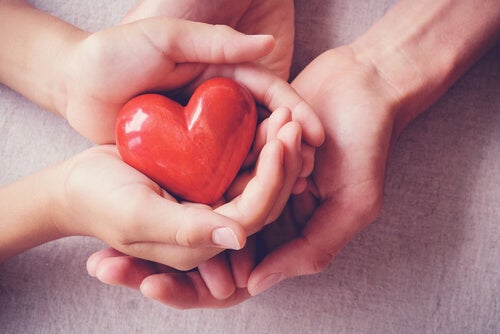Compassionate Empathy: From Feeling to Action


Written and verified by the psychologist Valeria Sabater
If there’s one thing the world needs right now, it’s compassionate empathy. What this means is not settling with understanding, connection, and a heart that hurts for other people. What this means is taking action and helping. It means deciding to provide someone support, affection, and true wellness.
Lewis Carroll once said that one of the secrets to life is understanding that we’re not here just to exist. We’re also here to help and make sure that everyone can experience the world in a dignified, beautiful way. But let’s be honest, it can be really hard to do that for people sometimes.
It’s hard because so many of us get stuck on intentions and feelings but never take action. For example, we all support endless causes on social media with a like, a share, or by signing petitions. We’re attuned to countless problems in our society. But we don’t always see the problems that are much closer.
Compassionate empathy means being able to provide useful support to the people in your life. The problem is that you might not actually realize that this friend, family member, or coworker needs active support in a given moment. Or, in some cases, maybe you do realize it but you just don’t know what to do.
“What we have done for ourselves alone dies with us; what we have done for others and the world remains and is immortal.”
-Albert Pike-

The third kind of empathy
Compassionate empathy was defined by psychologist and emotional expert Paul Ekman. The idea was also helpful to Daniel Goleman when he was developing the concept of emotional quotient, which is part of the theory of emotional intelligence.
It’s also important to understand that empathy isn’t a narrow, flat concept. It can be about much more than simply understanding someone else’s emotional reality.
The concept of empathy is actually much broader and more complex than that. And the truth is that a lot of people wouldn’t score very high if they had to take a test for emotional competence. Let’s delve deeper into what empathy is.
Types of empathy
- First, there’s emotional empathy. In the words of Daniel Goleman himself, it can often be contagious and even dangerous if you don’t know how to put boundaries on it and you saturate yourself with other people’s suffering.
- This type basically means being able to connect with someone else’s emotional reality. It means feeling what they’re feeling and stepping into their world. It’s a process that involves your mirror neurons, your feelings, and even physical responses.
- Then there’s cognitive empathy. This type involves using your intellect and cognitive processes, such as attention, reflection, communication, and inferences. It basically involves knowing how a person feels, why they feel that way, and, in some cases, even being able to guess what they might be thinking.
- Lastly, there’s the great unknown, the part so many of us neglect: compassionate empathy. In the words of Daniel Goleman, “True compassion means not only feeling another’s pain but also being moved to help relieve it”. This type of empathy means understanding how they feel and why, and then doing something to try to help.

What are people with compassionate empathy like?
These kinds of people have taken one step further in their personal growth. They’re basically experts at managing relationships with other people.
They’re balanced and know how to respond to different situations
Practicing and honing your empathy will help you to always act from a place between logic and emotion. It can help you evaluate situations from a very balanced perspective. That means you don’t get carried away by people’s emotions but also go beyond the cold logic that sees things but does nothing.
Thus, a person with compassionate empathy knows how to act in just about any situation. They’ll always find a way to provide the right kind of support.
They’re good at reciprocity
Successful relationships and meaningful bonds always rely on a sense of reciprocity. It’s a constant “You scratch my back and I’ll scratch yours”. It means knowing how to listen and respond, and also feeling like you deserve the same.
That’s what makes compassionate empathy a part of personal wellness. It’s not just about helping other people. It also means receiving support yourself when you need it.

They know the key to human connection
Human connection is at the core of compassionate empathy. It means knowing how to approach someone authentically. You’ll understand their personal reality and accept it without judgments, prejudice, or ulterior motives. This connection, based on respect and appreciation, will also help you see their needs and what you can do to help.
But just as importantly, being good at compassionate empathy doesn’t just mean acting like a savior whenever you help. Knowing how to provide support is truly an art. You have to know what to offer and how because people don’t always ask for what they need. You always need to keep that in mind.
We want to wrap up with a quote by Thich Nhat Hanh. “The most precious gift we can offer anyone is our attention. When mindfulness embraces those we love, they’ll bloom like flowers”. That’s true, but sometimes you have to go one step further. You need to spring into action, you need to know what the right thing to do is.
All cited sources were thoroughly reviewed by our team to ensure their quality, reliability, currency, and validity. The bibliography of this article was considered reliable and of academic or scientific accuracy.
- Gilbert, P. (2019, August 1). Explorations into the nature and function of compassion. Current Opinion in Psychology. Elsevier B.V. https://doi.org/10.1016/j.copsyc.2018.12.002
- Riess, H. (2017). The Science of Empathy. Journal of Patient Experience, 4(2), 74–77. https://doi.org/10.1177/2374373517699267
This text is provided for informational purposes only and does not replace consultation with a professional. If in doubt, consult your specialist.








